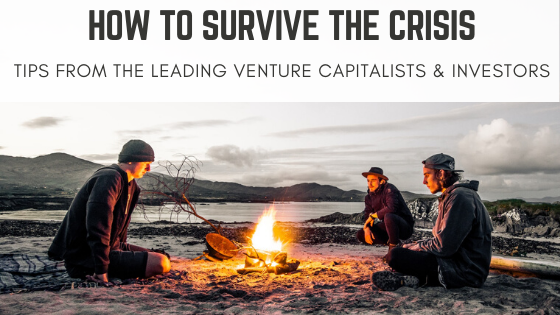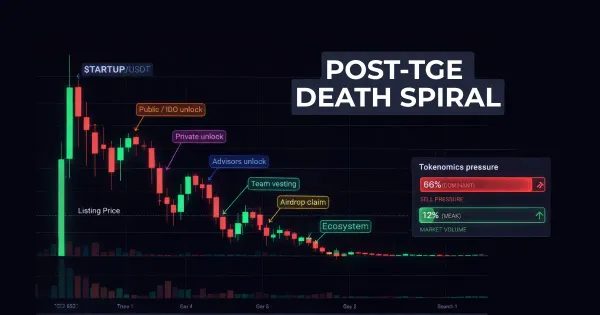How to Survive the Crisis: Tips from the Leading Venture Capitalists & Investors
How to Survive the Crisis: Tips from the Leading Venture Capitalists & Investors

The process of attracting investments, assessing risks, entering new markets and choosing the right industry becomes more acute for any startup founder when it comes to a critical situation, such as a global pandemic or crisis.
During the period of a “deep downtime”, not only startups begin to review their main lines of business activities, but also venture capital funds in order to support the ongoing projects in the investment portfolio and optimize the risks of new investments. Online meetings, a slowed down decision-making process, lack of liquidity - all this suppresses the level of adventurism of any beginning team or project.
But what really happens behind closed doors? How do startups get started now to survive? InnMind, an international business network for startups and investors, conducted a series of interviews with the leading Silicon Valley and European venture investors to find out the answers to these questions.
Let's start with the forecasts: when the situation will improve and whether it is worth waiting for a “miracle”
Despite the obvious problems of the venture capital market faced by the industry, the leading market representatives respond positively about future innovations and see an undoubted potential for investments at this stage and in the coming months.
“It’s a good time for venture business; it can be a good time for venture capital. In any case, we do not want to miss any entrepreneur who could become the next ‘unicorn’ ”

Tim Draper, Venture Investor, founder of Draper VC & Draper University in Silicon Valley, USA
“Overall, we increase our investment activity, looking for new opportunities in the opening niches. As if we can get into a time machine, return back 3 years ago and start investing with all the knowledge and capital access we have now. For new investors, it is hard to think of better timing to step in”

Pavel Cherkashin, Managing Partner at Mindrock Capital
A positive attitude does not mean that startups should not pay attention to the current status of the project and its demand in a rapidly changing market. The majority of the investors surveyed also recommend to analyze the current trends in your market in connection with a pandemic, and if necessary, be open to the possibility of adapting (pivoting) the product in accordance with the changing priorities of the target audience or even changing the industry to enter a more attractive market in this situation.
The most promising startup industries that attract the most interest and attention of investors in 2020-2021
Everything related to automation, productivity and the organization of online digital space - will take up. In the traditional sector, one can expect an accelerated growth in the re-positioning of industries such as insurance, restaurant and hospitality, travel, medicine, education, agriculture, etc., in which digital transformation processes are already taking place. Promising solutions include on-demand insurance, online diagnosis of patients, detection of diseases and the creation of new drugs using big data and artificial intelligence, etc.
“Everything AI and robotics. As the current crisis has shown, humans are fragile, governments are quick to lock us up in our homes, so for the civilization to survive if, God forbid, something more serious than coronavirus hits us, we need to start relying on robots more and more. Especially in essential industries, such as farming and agriculture, but everywhere else, too”

Anton Antich, serial venture investor, former board member of Veeam Software
“In the long term, I’m looking to change strategy and find out what actually is going to happen in some period of time when we will have the opportunity to use something for good. Like remote education, remote dental service or remote medical care, or even remote consulting”

Alexander Galitsky, founder and managing partner of Almaz Capital VC
The concept of “Loneliness Economy” is a new alternative segment, according to Pavel Cherkashin, which will be able to provide a successful take-off for startups in the field of online technologies. Consumers who are now facing the possibilities of the digital space for the first time are discovering a new experience of online interaction, after which it will be difficult to switch back to the traditional sector. This applies to the already well-known blockchain and smart contract technology sector, which, among other things, is one of the main focuses of Tim Draper's venture capital fund.
What actions need to be taken now and what to focus on
“The main thing is to survive,” as Alexander Chachava, the managing partner at Leta Capital, commented in his interview, and to determine an optimal level of “survival”, while maintaining the main flow of operations, liquidity, “cash”, and most importantly - the entrepreneurial spirit.
«If you have enough resources and you feel you can survive and you can feel good within the next six months, maybe 12 months, go develop more features that increase marketing efforts, increase sales force. If you are not so good, if you don't have enough cash flow and if you see that your customers are not paying you anymore or will not pay, probably will not pay, maybe suspend some payments or deposit some part of salaries of your team, exchange part of salary on some options»

Alexander Chachava, Managing Partner at Leta Capital
«Of course, you still need to look long term since short term is not a right way of thinking. You need to look at the current situation to see what you can do right now, how can you help. But definitely you need to see that similar disasters will happen from time to time, and you need to be ready for new waves of it. So, you will see how your product, or your development can be helpful here, but also how it can damage you. It is what you need to pay attention to. And to also monitor how their sales model is organized, how’s marketing organized. It is important since you will have fewer physical demonstrations and also no capability to travel so much»

Alexander Galitsky, founder and managing partner of Almaz Capital VC
“Cut all expenses as much as possible, save money, cash is king. If you have customers, if you are at that stage and you have customers that owe you money, try to be aggressive collecting money because some of your customers are not going to make it and those accounts receivable are going to evaporate. Don’t depend on that. If somebody is offering you investment and it’s not the best terms or something that you thought would be reasonable last week, change your mind. And cash is king again”

Vitaly Golomb, Managing Partner at GS Capital
By cutting costs and optimizing your operations, you should think about new opportunities instead of nervously waiting for the end of the quarantine period. According to the comments of Peter Brown, a member of the European Association of Business Angels (EBAN), you need to focus on the development and strengthening of our network of consumers and clients (“Cusdev”), find loyal customers, optimize the product portfolio based on their feedback. This also applies to the B2B segment in particular.
Bill Rachert, co-founder of Garage Technology Ventures and Igor Ryabenky, founder of AltaIR Capital, in recent interviews with the CEO of InnMind, Nelli Orlova, also emphasized that startups should turn to their current investors for help and advice, and not wait until these funds will try to contact them themselves. Founders should not make a mistake avoiding outstretched hands and offers of help, but rather take the first steps themselves, especially if the company has already attracted investments.
You should also not focus on the topic of crisis and pandemic in order to announce the release of a new product or reach out to potential customers via e-mail with the heading "We move forward despite the crisis." Everyone has already satiated with this topic and a potential client wants to see how your product can make his life easier right now and set it up for a positive wave.
“You should become a‘ pioneer ’after the crisis, that is, now it’s worth thinking about which promotions, marketing campaigns, announcements you can launch after. If you are a pioneer at the end of the crisis and make a unique offer or launch a new product, then you will receive the closest attention and can quickly get back on your feet ”

Guido Schmitz-Krummacher, Managing Director of the Lisk Foundation
Summary or a guide on the behavior of startups during a crisis
- Most investors and venture capital funds are positive about receiving new projects. Do not miss the opportunity to modify your pitch right now.
- A proactive approach to a changing market environment is important. Adapt your products to the growing demand from consumers or customers: robotics, artificial intelligence, blockchain technology, and everything related to digitalization and the transition to the online space of traditional industries.
- Cut costs and focus on your main cash flow. Find balanced workflow optimization solutions.
- Think ahead: do not invent short-term solutions that can turn into a long-term problem.
- Communicate, develop a network and listen to current customers or consumers: while most people are sitting at home, you need to use these “spots” of free time.
- Carefully consider marketing campaigns as soon as the global situation improves. With proper and competent planning, these releases can become your "lifeboat".
You can watch the original video interviews with investors, as well as text transcripts here: https://expert.innmind.com/coronacrisis
You can read the original article here
Food For Thought:
📌 Pandemic startup support: useful information, links and resources for startups in Europe





